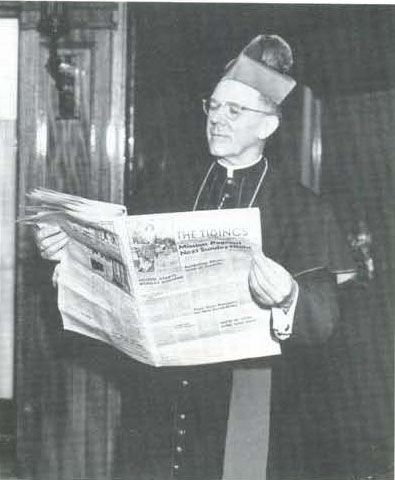Since 1878, Spanish-born Bishop Francisco Mora y Borrell served the spiritual needs of California’s Catholic faithful, traversing the Diocese of Monterey-Los Angeles, an area comprising the entire southern half of the state. As his health declined, Bishop Mora asked Pope Leo XIII for help.
In 1894, the energetic Father George Montgomery of Kentucky was consecrated bishop for Los Angeles and named coadjutor, an auxiliary bishop with the right of succession.
The Catholic Tidings, as this newspaper was known in 1895, appears to have been Bishop Montgomery’s idea. It was bursting with Catholic news. Just as is found in The Tidings today, there were features devoted to the papacy, news of the world, local events and those taking place in other parts of the United States.
Just last week, The Tidings carried stories about Pope Francis’ new encyclical, Laudato Si’, regarding the proper care of the earth’s resources. The first issue of the Catholic Tidings took note of Pope Leo’s April 1895 apostolic letter, Amantissima Voluntatis, addressed to the English people, in which His Holiness expressed his earnest hope for the success of Anglicans seeking unity with the Holy See, one of the first stirrings of modern ecumenism.
By 1895, the Los Angeles cathedral of St. Vibiana was already 19 years old. The Catholic Tidings described how Cardinal Edward Manning laid the cornerstone for the new cathedral of Westminster in London — a great event, since Catholic emancipation in England had occurred only 45 years earlier. Readers who have had the privilege of visiting this beautiful edifice will be interested to learn that its total cost was $1.2 million.
Last week’s graduation issue celebrated students from the many elementary and secondary schools in the archdiocese. In June 1895, the Alumni Society of St. Vincent’s College gave its first annual commencement banquet. St. Vincent’s later became Loyola-Marymount University.
A discussion of the books read by younger Catholics found it deplorable that H. Rider Haggard’s fantasy novels were so well-liked. The writer, however, was comforted by the popularity of Dickens’ “David Copperfield,” Sir Walter Scott’s “Ivanhoe” and Hawthorne’s “The Scarlet Letter.”
Catholic news briefs in 1895 included:
> Cardinal James Gibbons of Baltimore presided at the Corpus Christi celebration in Rome.
> Father P. Glyne of Carson City, Nevada, was appointed by the governor as chaplain of state institutions.
> A reading circle was started in San Diego by members of the Young Ladies’ Sodality of the Immaculate Conception.
> The golden jubilee of the Notre Dame University in Indiana took place June 11-13.
> Thirty-six young ladies received the white veil and entered the novitiate of the Sisterhood of St. Francis at Glen Riddle, Pennsylvania.
> The first black Catholic church in the South was dedicated at New Orleans by Archbishop Janssen.
> A bill providing for the commitment of intemperate women to the care of the Sisters of the Good Shepherd for one year, under certain restrictions, was signed by Governor Morton of New York.
The Catholic Tidings also reported in 1895 that Bishop Montgomery had addressed a large gathering concerning the troublesome problem of labor and capital, something of especial interest in our own time. The speech was entitled: “Man’s Departure from the Law of God, the Sole Cause of the Overstrained Relations Between Labor and Capital — Return to that Law the Only Harmonizing Power.”
He spoke eloquently and it’s worth sharing a sample of his remarks. Having castigated unbridled capitalism and uncaring laborers, Bishop Montgomery proclaimed: “This antagonism, then, among men, among intel-ligent beings, in an age when we are so boastful of human achievements, ought to make us humble and more modest in our self assertion.
“I lay it down as a principle that this antagonism comes from man’s having departed from the law of God that was intended to harmonize and adjust all man’s differences and difficulties and that the only complete solution to the vexed question is a return to that law.”
Alas, today we are even farther away from the application of God’s law in domestic matters.
Finally, in a mission statement, the editor of the new paper declared:
“CATHOLIC TIDINGS believes with Washington that ‘while just government protects all in their religious rights, true religion affords government its surest support.’
“In true American patriotism — steady loyalty to American principles and institutions — CATHOLIC TIDINGS will yield to none. In these efforts it confidently relies on the co-operation of the Catholic people.
“CATHOLIC TIDINGS has come to stay.”

